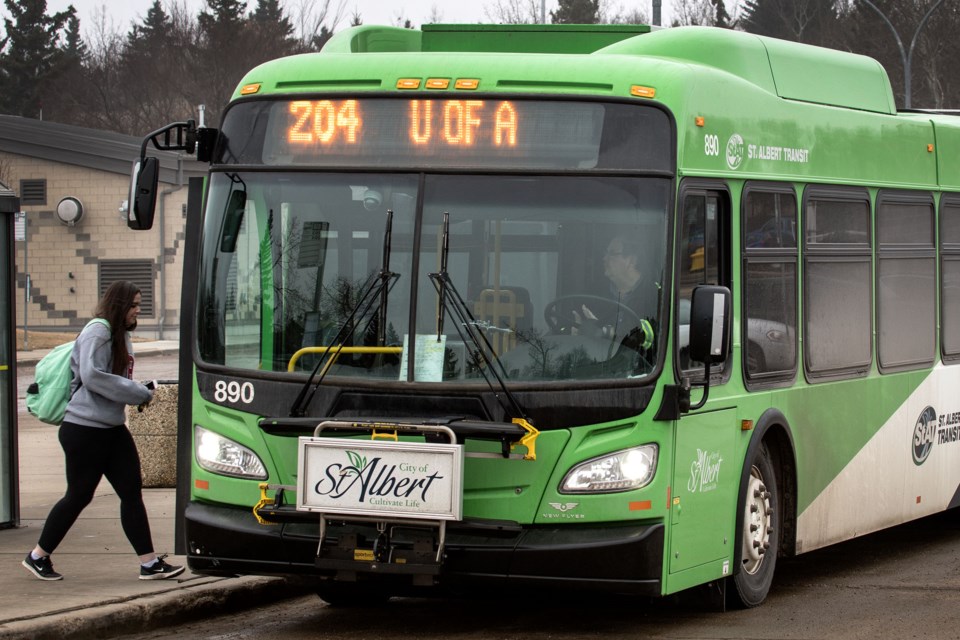It may result in better service, but bringing St. Albert’s contracted public transit in-house would cost more than the current set-up.
City councillors spent about two hours Tuesday going over a report from consultant Deloitte on the implications of getting into the business of people moving. Excluding Coun. Sheena Hughes, who chaired the Feb. 11 standing committee of the whole meeting, they said nothing in public about it.
The consultant considered three scenarios: keeping the contract, bringing service in-house when the current contract expires in 2028 and bringing service in-house two years early. Their report indicates there is no early cancellation penalty in the current contract.
City staff estimate transit cost at $15.5 million to deliver in 2024, a 2.6 per cent increase over 2023.
Council heard St. Albert Transit has been provided by a contractor since its 1986 inception and while there may be some efficiencies realized, it would cost the city more to run as an internal department, mostly because the employees would be more expensive.
The number of FTEs would increase and more positions would be required in city departments from human resources and safety to information technology. The consultant would also recommend hiring a temporary change manager to oversee the transition from provider PWTransit.
There would also be costs related to buying and maintaining vehicles and software, and a loss of institutional knowledge in particular related to the energy transition.
“The city may lack the experience needed to efficiently transition to operating electric and hydrogen buses, whereas PWTransit can leverage its prior experience from similar transitions in other cities across the country,” the redacted public version of the report reads. “The same applies to the implementation of smart buses and fare collection systems, purely from an operational standpoint.”
The benefits to the city include potentially improved service delivery and customer satisfaction as a result of being able to monitor transit drivers directly as city employees.
“Bringing transit delivery in-house provides direct oversight of drivers’ performance. The city’s ability to implement stricter standards ensure that drivers meet expected service levels and provide targeted training or support could lead to improved service quality and customer satisfaction.”
The consultant also believes changing the mix of full-time and part-time drivers could save the city some money, but warns the market for qualified drivers is competitive and could result in the city having to offer more to attract employees.
If the city stays with a contract scenario, there is a risk the next contract will cost more since there will be fewer bidders.
"The recent request for proposal for service delivery attracted four respondents, including PWTransit (the incumbent) as well as other companies such as Transdev Canada and First Transit,” the report reads. “However, with the recent acquisition of First Transit by Transdev Canada, the number of competitors has decreased. This reduction in competition could lead to higher costs to provide the service.”
Hughes said she was repeating a question Mayor Cathy Heron asked in the closed session when she asked Tim Saunders, the city’s director of public operations, whether the report was a good use of taxpayer dollars.
Saunders said the exercise was “very valuable."
“It is going to be something we will be able to refer to when we prepare for future negations as we look at our overall operation,” he said. “It prepares us with a model that we can use to look holistically at what is best for the city.”
The committee accepted the report as information.
St. Albert Transit at a glance (2023)
- 1,084,676 linked trips, including 804,000 commuter trips (6.3 per cent above pre-pandemic levels);
- 17 in-city routes;
- seven routes through Edmonton;
- two on-demand service routes;
- 33 diesel 40-foot buses;
- 20 diesel 60-foot buses;
- seven electric 35-foot buses;
- 7 handi-transit vehicles.




